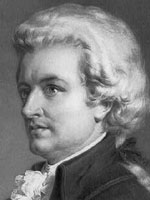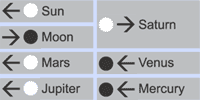Interesting facts
The Travels (The White Sun, The White Mars)
Wolfgang's father Leopold wanted his son to become a composer, therefore he decided to present his son to the music world as a virtuoso performer as it was demanded by ancient custom. Hoping to get a good position for a boy and find a patron among the representatives of the nobility, Leopold decided to make a concert travel visiting royal and princely European palaces. This is how Mozart's travels, lasting almost all of his life, started. After a number of successful concert tours, the father decided that the whole family goes to Vienna, which was the centre of European culture and the arts, and therefore it gave the musicians great opportunities. Influential patrons provided them with great support. Mozart produced the true furore among the representatives of imperial palace in Vienna, flawlessly playing the diverse music: his own improvisations and works, which court composer gave him, as well as demonstrating the diverse playing tricks: playing with one finger and playing on the covered with cloth keyboard. It was a piece of cake for Wolfgang... Throughout his life, Mozart almost did not stay in one place for a long time, changing countries and cities: Munich, Paris, London, The Hague, Amsterdam, Rome, Milan, Naples, Venice, Florence, Prague...
The Capricious prodigy (The Black Venus, The Black Mercury)
The family had a warm reception in Paris - the royal blood expressed the interest and they were invited to Versailles. However, small Mozart did not like to play in front of people, who did not understand the music; if it was possible to persuade him by requests or tricks, he played only inferior and minor things. And when he was in the palace, he held his own: he did not agree to play nothing serious until Wagenseil, one of the best composers and musicians of that time, was not called. Mozart said, reluctantly yielding to pressure then: "I am going to play a concert to you now, - he told him, - and you are going to turn the pages for me". Mozart treated the august ladies very kindly: he sat on the empress's knees and covered her with kisses; he promised princess Marie Antoinette who was the same age as he then to marry her in gratitude, as she helped him to get up when he fell on the smooth hardwood. Another grand lady wished to see them. She examined a small artist with a great curiosity and even set him on a table, but she stand on ceremony and avoided a kiss from a child. "Who is this? Why won’t she kiss me? The empress herself kissed me!", cried the boy fiercely.
The Teacher (The White Jupiter)
The reception in Vienna was wonderful - Mozart was extremely pleased. He hoped to become a famous pianist and a teacher, and thus to pave the way for his works. It happened later – when he was at the zenith of his fame, he received huge fees for his academies and the publication of his works. He taught many students as well. The English musician Thomas Attwood, who served as a Kapellmeister, an organist at St Paul's Cathedral, a musical mentor of the Duchess of York, and later of the Princess of Wales, was among them.
The Disobedience (The Black Venus, The Black Mercury)
Mozart received compliments in Munich, and taking advantage of the absence of his employer, he decided to stay there longer. As soon as it was found out, Mozart was ordered to come to Vienna urgently. The composer immediately realized that he fell into disfavor. Having received many good comments pampering his pride in Munich, Mozart was offended when the archbishop treated him like a servant, and even ordered him to sit next to the body servants during the dinner. Mozart had already decided to leave archbishop, and was just looking for a suitable pretext to justify his decision: he had to convince his father and even himself that such move was the protection of his honor, but not of the personal interests. The archbishop was really stingy, rude and unjust ruler, who not only prohibited Mozart to perform for his own benefit, but also strongly restricted Mozart’s access to the houses of the nobles – the potential Mozart’s patrons. As a result, the argue reached its climax: Mozart gave his resignation, but the archbishop refused to accept it. Then the musician began to behave expressly provocatively, hoping to obtain freedom this way. Finally, he reached the goal: the composer was fired next month.
The request for the assistance (The Black Moon, The White Saturn)
Unfortunately, the fate of the musician at that time depended on "the good and the great", their opinion was crucial. That is why Mozart’s path was unfairly difficult. He lived in constant need. He had to overcome the resistance of envious enemies every day and every hour. He had to ask for protection and assistance and it saddened the joy and happiness his work gave him. A chain of problems led to sad financial state, and he was forced to write numerous heartbreaking letters with requests for financial aid to his friends: "My dearest and best friend and esteemed colleague! My God! My situation is so poor that I wouldn't wish that to happen to my worst enemy. And if you, my the best friend and brother leave me, I would be damned without any fault of mine, together with my poor sick wife and a child. Even recently, when I visited you, I wanted to pour my heart, but I lacked the courage! [...] Unfortunately, my fate is not well-disposed to me in Vienna – I cannot earn anything, even if I want to... Everything depends on you now. My only friend – would or could you lend me 500 florins more?"
Fighting competitors (The White Mars, The Grey Saturn)
Mozart's attitude to his fellow musicians is curious. He liked the works of Bach and Handel, Haydn and Gluck; he was fond of the representatives of the Mannheim school and Italian opera... But he did not find any warm word for the composers he had to compete with. Yomelli’s music was too "crabbed" for him; he said Salieri was a schemer, even though his "guilt" was explained by the fact he was appointed Kapellmeister, though Mozart considered this position to be more suitable for himself. When a German organist Schobert played the organ best than Mozart did, the tool was guilty. Mozart never missed a chance to make fun of his competitors. Once he wrote a melody specifically for pranking Salieri. He tried to convince him that he was the only person in the world, who could play this complex work. Salieri looked at the notes and said that this melody was impossible to play, because both arms in different parts of the keyboard were involved, and in one of the passages it was needed to strike a note in the middle. Mozart played the composition at once, using his nose for that complex chord.
The Lightheadedness (The White Saturn)
Mozart did not really think about the consequences of his actions. Making the first steps in Vienna, he found the refuge at the house of his old friends. However, it was rumored that Wolfgang was going to marry one of the daughters of the mistress of the house. His father was really angry; he stubbornly said that Wolfgang should change the apartment, and received the following reply: "It is a pity that I have to hire another apartment because of the ridiculous rumors. I would like to know what kind of people are those, who are happy talking about it, not having any reason. Does it really mean that if I hire an apartment, I have to marry the daughter? [...] I am not saying that I am inaccessible to mademoiselle, with whom I was already matched, and I do not talk to her, but I am not in love; I play tricks and joke with her if time allows me. If I had to marry all those women I joke with, it could easily happen that I would have had 200 wives". But Mozart really did the thing he wrote to his father by marrying Constance Weber.

